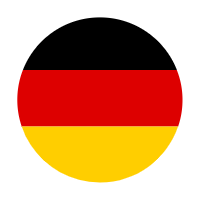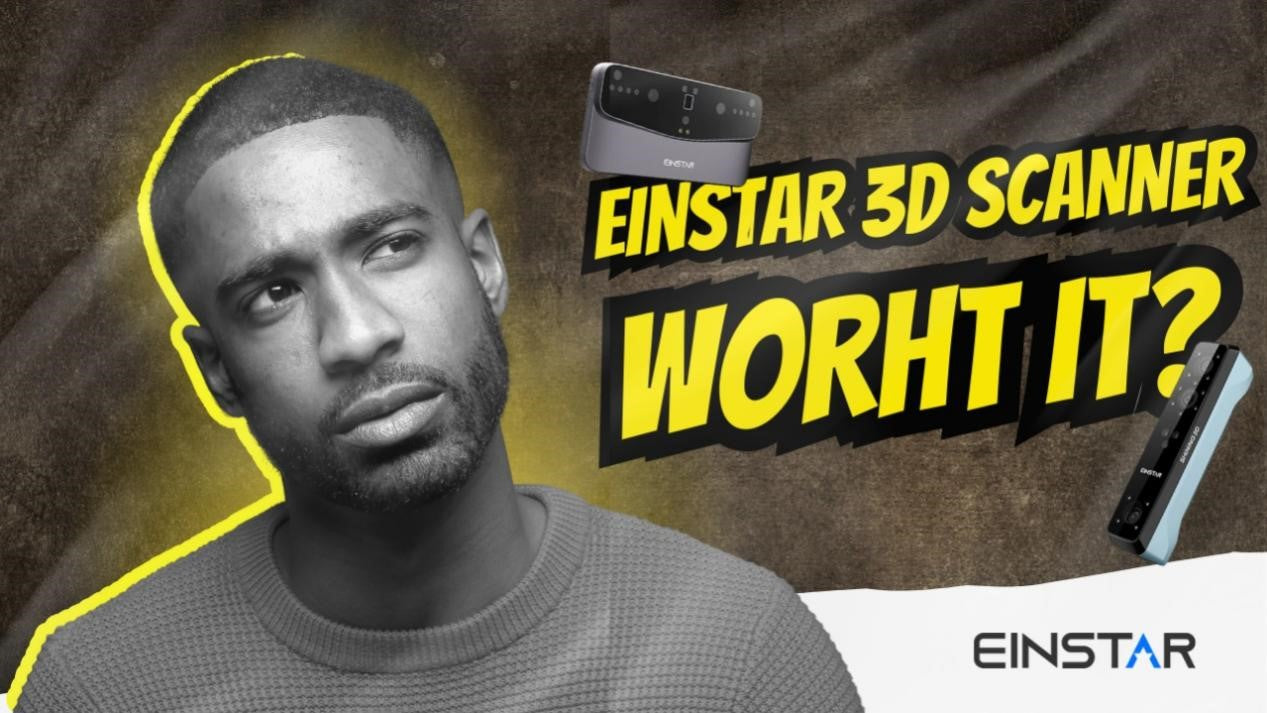EINSTARは、構造化光3Dスキャン技術への入門機として最適です。EINSTAR 3Dスキャナーとその先進機種であるEINSTAR VEGAは、趣味人、専門家、そして教育者にとって、手頃な価格でありながら強力なツールとして3Dスキャン市場で注目を集めています。
このレビューでは、EINSTAR 3D スキャナーが投資する価値があるかどうかを判断するのに役立つように、主な機能、スキャン機能、実際のパフォーマンスを検証します。
アインスター&アインスター ベガ
この比較は、さまざまなユースケースにおけるそれぞれの強みを強調する具体的なデータ ポイントを使用して、各モデルの優れた点を明確に把握できるように構成されています。
スキャン解像度、ワークフローの柔軟性、予算の考慮のいずれを優先するかにかかわらず、この内訳により、どのスキャナーが要件に最も適しているかが明らかになります。
|
|
||
|
スキャン技術 |
赤外線VCSEL構造化光 |
デュアル:赤外線VCSEL(高速)+ MEMS(HD) |
|
スキャンサイズ範囲 |
中型から大型の商品。100×100×100mm未満のものは推奨されません。 |
2 つのスキャン テクノロジにより、小さなオブジェクトから大きなオブジェクトまでサポートします。 |
|
点間距離(解像度) |
0.1mm~3mm |
HDモード: 0.05 mm~3 mm 高速モード: 0.5mm~10mm |
|
作動距離 |
160~1400 mm(最適:400 mm) |
HDモード: 100-350mm 高速モード:270-1500mm |
|
スキャン速度 |
最大14fps |
HD: 最大15fps 高速:最大20fps |
|
重さ |
500グラム |
535g(レギュラー) |
|
力 |
USB電源、バッテリー不要 |
5000mAhバッテリー内蔵 |
一般的に言えば、
-
テクノロジー: EINSTAR VEGA は、デュアル スキャン モード、スタンドアロン コンピューティング、高度な機能を備え、信頼性の高い PC 依存の構造化光スキャナーです。
-
対象物サイズ範囲:EINSTARとEINSTAR VEGAは、中型から大型の物体をスキャンできます。さらに、EINSTAR VEGAは、 小型物体のスキャンに利用可能なMEMSスキャン技術も採用しています。
-
携帯性: EINSTAR VEGA は完全にワイヤレスでスタンドアロンなので、モバイルや屋外での使用に最適です。EINSTAR は携帯可能ですが、PC に接続されます。
-
ソフトウェアの互換性: どちらも主要なフォーマットと堅牢なソフトウェアをサポートしています。EINSTAR VEGA は、オンボード処理、ワイヤレス/クラウド統合、定期的なアップデートを追加します。
最高の低価格3Dスキャナーに関する公平な顧客レビュー
当社のチームは、2台の構造化光3Dスキャナーに関するあらゆるチャネルからのほぼすべての顧客レビューを収集しました。ご安心ください。100%の客観性を保証しますので、称賛の声も不満の声もすべて掲載されます。
さて、比較のために、それぞれの長所と短所をまとめた表を以下に示します。
|
|
アインスター |
アインスター ベガ |
|
最適な用途 |
趣味人、教育者、小規模プロジェクト |
使いやすく、ワイヤレス操作、 幅広いサイズの製品に対応する高解像度スキャン。 |
|
主な利点 |
手頃な価格 |
ワイヤレス、デュアルモード、高解像度 |
|
最大の欠陥 |
通常、100×100×100mm未満の製品はスキャンできません。 |
バッテリー寿命と輸出制限 |
アインスター:予算に優しいパフォーマンス

✅ 長所
-
優れたコストパフォーマンス - 1,000 ドル未満で、趣味人や中小企業に安定したパフォーマンスを提供します。
-
高速サーフェスキャプチャ - 優れたテクスチャ再現でオブジェクトを素早くスキャンします。
-
オンボード メッシュ編集 - 基本的な後処理における外部ソフトウェアへの依存を軽減します。
-
バランスの取れたスキャン品質 - 0.1 mm の解像度は、ほとんどのプロトタイピング、リバース エンジニアリング、教育用途に十分です。
検討事項と解決策
-
サイズ制限– 最適な詳細キャプチャを保証するために、100×100×100mm を超えるオブジェクト用に設計されています。
-
最適化されたトラッキング- 平らな表面の場合、付属のマーカー ステッカーによりスキャンの安定性が大幅に向上します (ヒント: 1 つの作品に 4 ~ 5 個のマーカーを配置します)。
EINSTAR VEGA:プロ仕様のワイヤレス主力製品

✅ 長所
-
ワイヤレス & スタンドアロン – PC は不要です。内蔵処理機能により、外出先でもスキャンできます。
-
デュアルスキャンモード - 高速モード(大きなオブジェクト)+ HD モード(0.05 mm の精度)で多用途に使用できます。
-
人間工学に基づいたポータブル設計 - 三脚マウント、シリコン スリーブ、6.4 インチ AMOLED タッチスクリーンが付属し、使いやすさが向上しています。
-
定期的なソフトウェア アップデート – 時間の経過とともに追跡、後処理、ワークフローが改善されます。
-
優れたトラッキング回復 – 標準の EINSTAR と比較して、失われたスキャンを迅速に再取得します。
考慮事項と解決策
-
電源管理 – 過酷な現場作業プロジェクトの場合、EISNTAR VEGA は実行時間を延長できるパワーバンク充電をサポートします。
-
ハンドヘルド テクニック - 付属の三脚により閉塞のリスクが最小限に抑えられ、シリコン スリーブにより動的スキャン中のグリップが向上します。
-
ワークフロー統合 – StarVisionアプリ(無料)のエクスポートは、ほとんどのポストプロセス手法に対応しています。リバースエンジニアリングにおける高度なポストプロセス処理が必要な場合は、EXModelが役立ちます。

どれを選ぶべきでしょうか?
次の場合はEINSTAR を選択してください: 日常使用または教育目的で低コストで適切な品質のスキャナーが必要な場合。
次の場合は、 EINSTAR VEGA にアップグレードしてください: プロフェッショナル グレードのスキャン、ワイヤレス操作、最大限の柔軟性が必要な場合。
理想のスキャナーは、お客様のニーズによって異なります。では、あなたのプロジェクトに最適なスキャナーはどれでしょうか?ぜひ教えてください!









Share:
EXModel 2025 リリース: より高速、よりスマート、より効率的な設計ツール
SHINING 3Dが世界初のトライモードレーザー3Dスキャナー「EinScan Rigil」を発表